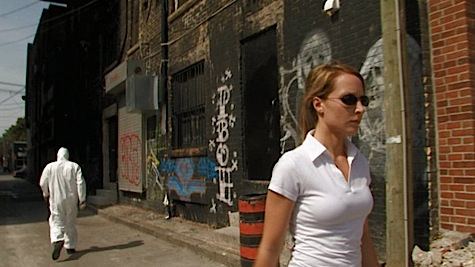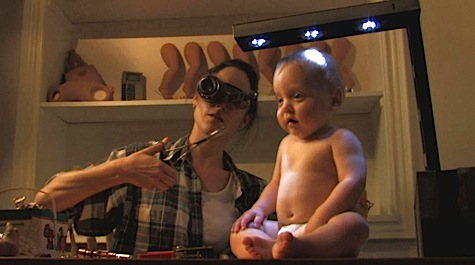The idea of the western world losing it’s economic, military and cultural dominance to the east is hardly a knew one in science fiction—it was a mainstay theme in cyberpunk in the 1980s, and perhaps most memorably explored on the screen in Blade Runner. But Ridley’s Scott’s dizzying glimpse at an Asian dominated 2019 Los Angeles was made thirty years ago, and now it seems to be a subject that SF is shying away from. We might not have flying cars or replicant slaves, and our streets might not be full of Japanese signage and imagery—but there’s little denying that China and India’s economies continue to grow and dominate while North America and Europe’s not only wain, but at times seem as though they are teetering on the edge of a very real collapse.
Perhaps this is why western SF movies right now are so scared of non-western futures—for the last few years Hollywood has mainly given us SF movies where present day America is the victim, bravely and patriotically standing up to an onslaught of foreign—sorry, alien—invaders: Avengers, Battlefield Los Angeles, Battleship, and those terrible Transformers movies all spring to mind. If Hollywood knows how to do one thing well it’s how to tap into the fears of American moviegoers, and apparently now they feel under siege—not just by memories of 9/11, but also by the harsh, tough reality of the shifting balance of the global economy. What Hollywood has never done quite so well—with the odd exception—is to approach these national fears in a way that doesn’t involve big explosions, patriotism and ultimately American victory. No, instead the task of taking a more realistic, if often darkly comedic, look at the west’s economic future has been left to Ghosts with Shit Jobs—an independent Canadian movie, incredibly made for just $4000.
The brainchild of Canadian novelist and comics writer Jim Munroe, Ghosts with Shit Jobs’s premise and set-up is fairly straightforward; it’s a mockumentary, in this case a fictitious Chinese TV show. The “ghosts” of the title is derived from Mandarin slang for white people, and the show follows a group of them around the slums of 2040 Toronto, as they struggle to cope with the only mundane, badly paid and often very hazardous jobs they can find.
Take Serina for example, who is introduced to us as a Human Spammer. She makes money by mentioning products, brand names and slogans in everyday conversation—the amount she gets for each “impression” determined by the social standing and demographic of who she’s talking to. As a result she finds herself constantly evaluating everyone she meets and trying to force herself into profitable social situations—as well as trying to block out the disgust she’s on the receiving end of whenever people realise what she’s doing.

Or there’s Gary and Karen—a married couple of struggling robot engineers, who make scarily lifelike robot dolls of babies for export back to China. The movie effectively portrays this as relentless hard work that dominates their life—these robot dolls don’t just look real but cry constantly, and even need changing and feeding. In some of the film’s most subtle, striking and well performed moments it shows them claiming, not wholly convincingly, to have learnt to turn off their emotional responses to a house full of distressed babies—even when dealing with the disposing of defective units. It’s science fiction black comedy at its disturbing best.
Then there’s Anton and Toph—the homeless children of a once great family of circus acrobats, whom scratch together a living foraging for web-silk left behind by genetically modified spiders that escaped from a lab—the spiders are apparently all long dead, but their near-indestructible silk is still used in the construction industry. The brothers put themselves in increasingly dangerous situations to try and find the few remaining deposits, climbing up abandoned buildings and structures, then swapping the silk for nothing more than water. It’s perhaps the least convincing of Ghosts‘ plot threads, but becomes more effective when you consider real-world stories of workers and children in developing nations scavenging dangerous waste dumps for rare materials.

And finally there is Oscar, the virtual janitor. Oscar spends most of his working life—in fact, far too much it transpires—“In World,” a virtual reality construct built from decades of surveillance footage and mapping data. Imagine a totally immersive version of Google Street View where you can travel not only geographically but also through time to watch recorded events unfurl again. Oscar’s job is to cover up logos for copyright reasons, “painting” over them so that they become pixelized and blurred out to other users. Oscar is perhaps the most likable character in Ghosts; he often refers to himself as being “slow” but he comes across as both the most grounded and self aware, and while his job doesn’t seem initially as unpleasant as some of the others it turns out it may in fact be the most dangerous, with overuse of the In World interface technology having disastrous long-term health consequences.

One of the things that works best in Ghosts With Shit Jobs is its use of slow reveals, and the drip-feeding of exposition—it doesn’t shy away from treating it’s audience as intelligent viewers, letting you gradually put two and two together rather than just info-dumping on you, resulting in a far more rewarding experience. At times this is a result of finding ways around the incredibly low budget—there are very view special effects and barely any CGI. For example we see most of the main characters interacting with augmented reality style interfaces at some point, but we never see the interfaces themselves—the assumption being that only the user can see them. Instead we watch the actors point and prod at thin air, and it’s to both the directors and actors credit that this never looks goofy—instead it lends a sense of subtle realism to the movie. Similarly, being forced by the budget to only use real world location rather than CGI backdrops gives the movie an immediate, often disquieting familiarity.
There are parts of Ghosts that don’t work as well, sadly—most notably the ending, which feels almost tacked on. It makes sense to have a catch up on what the characters are doing now—it fits the format of the fictitious TV show we are meant to be watching—but bringing them together for the first time seems slightly artificial, and one sequence involving robot-baby engineer Karen is positively silly. In fact it feels as though the ending is trying to be more upbeat, to offer the audience a glimmer of hope—but it not only fails to convince, it also feels like a bit of a cop-out; this is a dark story with a wicked strand of humour running through it, and is highly effective as such. Attempting a happy ending is redundant.
But don’t let me put that off you seeing Ghosts With Shit Jobs, not for single second. Not only is what has been achieved on this budget truly awe-inspiring, but when Ghosts works it is science fiction at its very best—challenging perceptions not just about technology and the future but also society, politics and human nature. As such it is unmissable.
Ghosts with Shit Jobs is currently touring film festivals, or you can by both physical and download versions direct from the official website.
When he’s not writing for Tor.com, Tim Maughan writes science fiction—his critically acclaimed book Paintwork is out now, and has been picking up support from the likes of Cory Doctorow and Ken MacLeod. So you should probably go buy it already.










